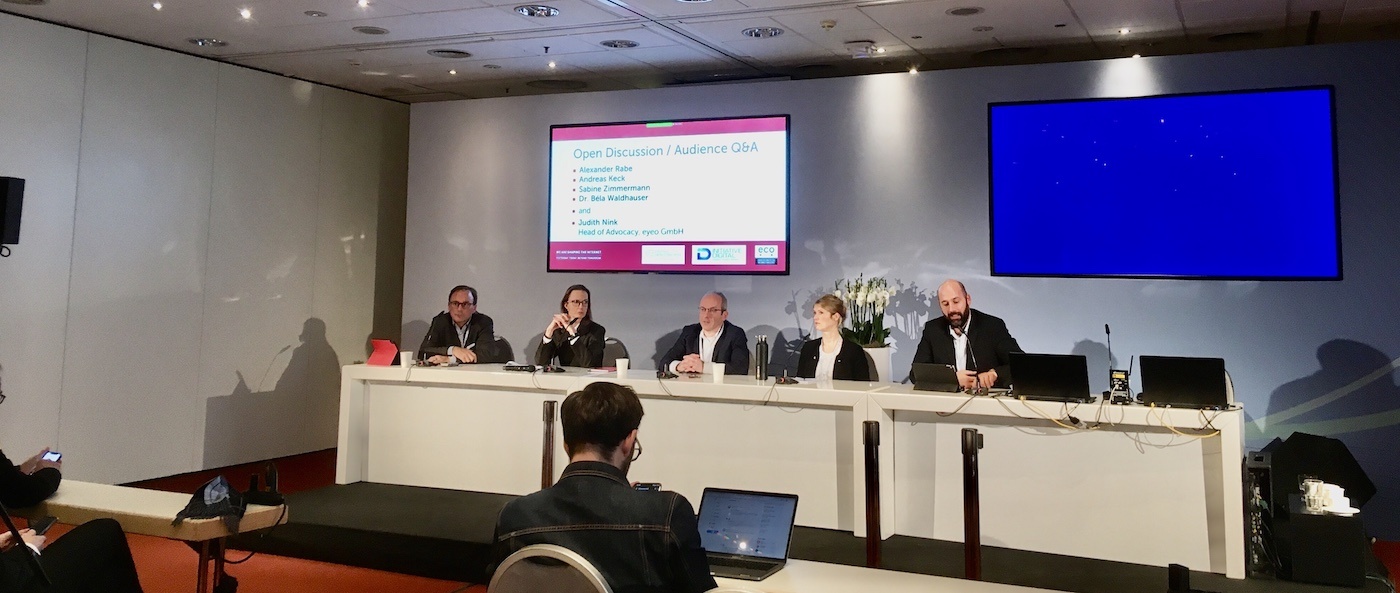The eco Association, the Alliance for the Strengthening of Digital Infrastructures in Germany, and Initiative Digital presented a panel session on Day Zero of the IGF 2019 on the needs of SMEs when it comes to digitalization and access to digital infrastructure. Moderated by Alexander Rabe, Managing Director of the eco Association, the panel included the speakers Dr. Béla Waldhauser, CEO of Telehouse/KDDI Germany and Spokesperson for the Alliance for the Strengthening of Digital Infrastructures in Germany, Andreas Keck, Vice Chair Bundesvereinigung Liberaler Mittelstand & Chair of German Mittelstand e.V., Judith Nink, Head of Advocacy eyeo GmbH, and Sabine Zimmermann, Managing Director and Partner, X.0 Group Team at X.0 Group GmbH, Executive Board Member, Initiative Digital.
The main themes running through the session were the approach of SMEs to questions of digital transformation, the need to raise awareness for the importance of digital infrastructure for successful digitalization, the need for gapless high-speed connectivity to enable new ways of working, and the lack of skilled workers and the need for education programs to develop future talent for the digital economy. Some topics applied a strong focus on the situation in Germany and on equally safety-focused and risk-averse countries. These included an unwillingness of SMEs in these countries to take risks and make the most of the opportunities that digital transformation represents, and the resulting tendency for SMEs not to be future-proofing themselves for the digital economy, and not to be making strong demands themselves for politics to improve broadband access to the Internet. Other topics, as the panel members made clear, are applicable across many regions and many countries.

One of these more global topics was that of data protection and the safety and security of data. There was general agreement that SMEs tend to want to know where their data is being stored – there is the need to know under what conditions it is being hosted, and certainly many SMEs feel more comfortable having this data hosted in their own country. According to the panelists, there remains a certain level of uncertainty among SMEs when it comes to the cloud, and there is the need for transparency about where data is stored. In this context, the new European data infrastructure project GAIA-X was also mentioned as a positive example.
Another topic which was seen to be generally applicable was the issue that most decision makers in politics and industry have a lack of awareness of the importance of digital infrastructures. Without digital infrastructure, digitalization will not work, and no industry will be able to survive in the coming years without reliable digital infrastructure. It was generally agreed that the rollout of broadband fiber and mobile networks to enable access in more remote areas remains essential for businesses to be able to function digitally. A country that does not recognize the need for digital infrastructure and provide for that need runs the risk of losing their innovative startups based on digital business models to other countries with better conditions. This includes such topics as connectivity, but also topics like the cost of power and the level of bureaucracy.
A further recurring theme which was raised was the more human element – the (re-)training of staff to meet the challenges of digital transformation. Many companies are having difficulty finding specialized staff – and this is not only a problem for SMEs, but also a problem for digital infrastructure providers themselves. Lifelong learning was considered essential for making the leap to a digital society. Furthermore, education needs to change to promote creativity and flexibility, and promote the desire for entrepreneurship. Education systems must recognize and promote talent, and there need to be more attractive conditions for scientists in order to promote innovative solutions. Companies themselves are needing to invest in training programs to ensure their future specialist staffing; however, this is beyond the means of some SMEs. In this context, the topic of specialist immigration was raised – but while immigration may be a solution for immediate requirements, it was also argued that all countries will eventually be facing the same problem, and that it is important for each country to invest in education.




